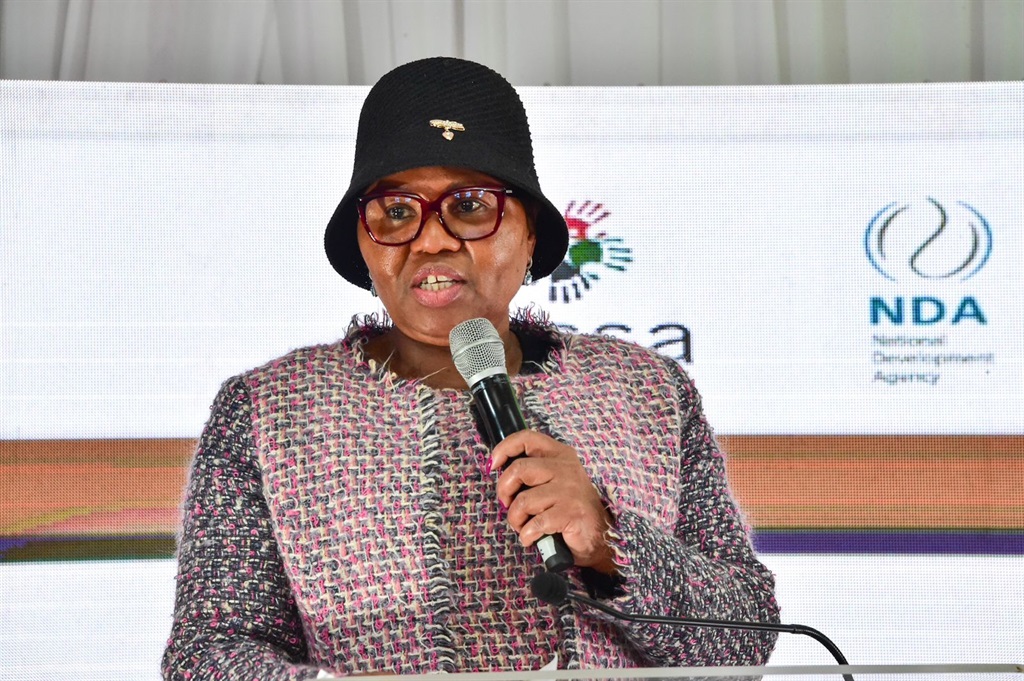
A Johannesburg youth has finally reclaimed his dignity and true identity after years of succumbing to drug addiction.
Sylvester Tshabalala, who has completed a seven-week drug rehabilitation programme, informed Social Development Minister Lindiwe Zulu that, in the past, he had been called demeaning names. But, after completing the programme and obtaining a certificate in project management, he was now proud to call himself by his real name.
Tshabalala briefly shared his journey during the marking of the annual International Day against Drug Abuse and Illicit Trafficking held at Nkanyisa Recovery Centre in Randfontein, Gauteng, this week. This year’s theme is: Leave no one behind: Availability, affordability and access to prevention and treatment services.
READ: Enyobeni's closure was a gift to other taverns, as underage drinkers remain undeterred
From skorokoro to vrr pha
Tshabalala emotionally opened up about how his life had become one of nothingness and about how it had now changed for the better, more than he could have ever imagined. To ensure that his destiny is restored, he attended rehabilitation classes religiously.
While, in the past, he lacked confidence and relied on drugs to boost it, following his time in rehab, he can now speak boldly without a hint of drugs in his system.
He said: “I saw that drugs were damaging my life and I got an opportunity (to change that). I went to the SA National Council on Alcoholism and Drug Dependence, Central Rand, and I was brought to this place in Randfontein.”
Addressing Zulu, he proudly added:
As part of the programme, Tshabalala shared how he was sent to school, where he met other individuals who were in the same boat as him.
"Outside, they called me sphara, malunda, nyaope. I am sure we were all called those names. But I am not nyaope; I am Sylvester Tshabalala."
He also completed a course in project management and urged those in attendance to come together in an effort to curb drug addiction in the country.
"Let’s fight drugs and be strong. Be the hope to other children. I want to be a role model to others. Others should say: ‘I want to be like Sylvester.’”
Zulu, who delivered her speech after Tshabalala and his peer, 36-year-old Ndimphiwe Mbatyoti, had shared their testimonies, said she was impressed because they were fully rehabilitated.
A step in the right direction
“What is delightful and brings a sense of fulfilment is that, in the process of their rehabilitation, they were able to learn various skills through which they can plough back into their communities," Zulu said.
"This is a step in the right direction, and I would like to applaud Nkanyisa Recovery Centre for their sterling work of ensuring that those who came into the centre and were labelled as drug users, are now better people who can inspire their respective communities that it is possible to be fully rehabilitated and live a normal life."
Zulu said the problem of substance abuse could not be taken lightly as it had a huge impact on the socioeconomic development of the country. She said it was the same problem which contributed to an already overloaded health system, and shortage of social workers who battle with multiple social ills in communities daily.
Tshabalala's counterpart, Mbatyoti, who hails from the Eastern Cape and began using drugs in 2012, said this had been a long journey for him.
"Like Sylvester, I was a skorokoro, but I received help from a social worker from Soshanguve, a township north of Pretoria," he explained. "She took me to the facilities in Witpoortjie under Mr Mpholo [the manager]. He was very strict, but today I am happy that his relentlessness is giving good results, in a sense that, when we were there, they said to us, 'You can’t sit here and do nothing.'
"So, the best is we should take you to a space where you can [learn] some skills with your hands, so that, when you go out of here, you don’t go out and stay on the [street] corners and continue with that life again,” said Mbatyoti, who completed his treatment in Witpoortjie.
"I am one year and four months clean from alcohol, and sober from drugs as well. It’s quite an achievement. I was doing brick laying, plastering ceilings and all of that. We were advised that our thinking as addicts must ‘not necessarily be dominated by things that won’t bring results'."
READ: Watch | Enyobeni Tragedy: Parents still reeling as tavern owner insists he is innocent
He said they were encouraged to not call themselves drug addicts.
"They teach us to say we have been through the process of addiction; now we are reclaiming our lives to be improved, contributing citizens in our communities and the people we surround ourselves with."
Zulu said that, according to the National Strategic Plan on Gender-Based Violence & Femicide 2020-2030, in comparison with its counterparts globally, South Africa had the highest levels of alcohol consumption and harmful drinking, such as heavy episodic drinking, which is a common occurrence.
She called on all citizens to unite as they continue with the battle against drug abuse.
“It is our responsibility as the collective to report known drug dealers and drug lords in our neighbourhoods to the police. It is also critical that communities must be assisted to access all levels of interventions, including prevention, early intervention, treatment, reintegration and aftercare services,” said Zulu.




 Publications
Publications
 Partners
Partners











